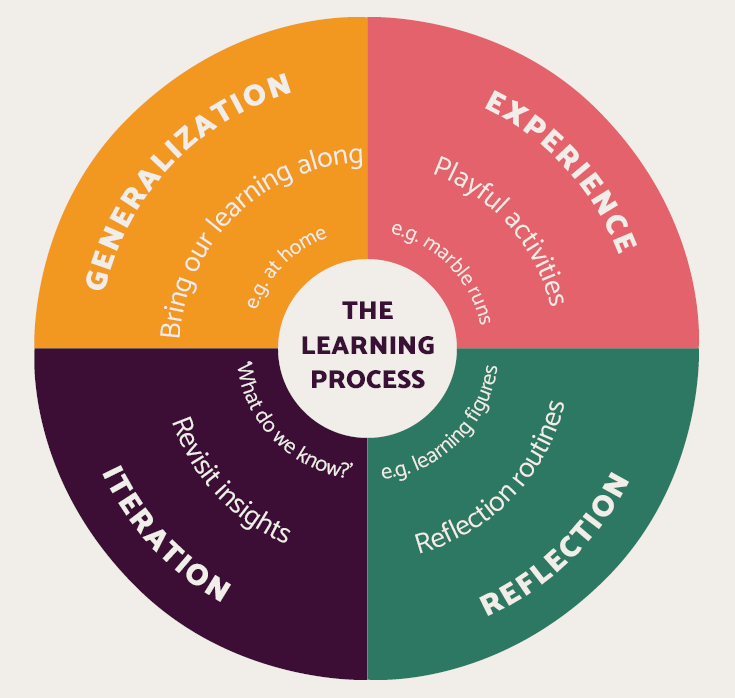Learning View
CollaboLearn has a distinctly constructivist approach to learning. We believe that developing learning processes includes the following elements:
- Motivation as a catalyst for any learning process, and therefore the intrinsic motivation for exploration is a crucial ingredient.
- Constructive and creative processes where we experiment and construct physical products that can be shared with others.
- Group learning as learning occurs when we are suitably challenged and participate in good interactions.
- Reflections since it is through reflection on our experiences that we become aware of our experiences and thus generate knowledge that we can use in other similar situations.
With this learning view, learning processes can be illustrated through an experience-based learning model in which learning occurs through circular movements from experience – reflection – iteration – generalization.
Many children need us to scaffold this learning process all the way around. CollaboLearn shows examples of how we can scaffold children’s social learning all the way around the learning circle:
Through play activities, we get the opportunity to gain social experiences, while reflection routines give us the opportunity to reflect on and share our experiences. The variation options in the activities mean that we can revisit what we learned from the last time and repeat the activities and reflections without getting bored over time. And when we are motivated to repeat, we learn. Over time, we can transfer the learning to other contexts and thus take our learning further into life.

The Learning Process
Experience
The child plays alone, in parallel, or together with other children. She sees how both the other children’s and her own actions affect the joint play. She feels that she is a part of a group. The child gains ownership when we make a framework for the activity that is meaningful and motivating. There must be room for the child to pursue her curiosity and immerse herself in the task. In this way, we find their inner motivation and use it to motivate the social experiences.
Reflection
The child reflects on her social experiences by combining details of the experience with knowledge from previous situations. The child can build her own understanding or feelings from the experience using materials, or the adult can build and show what he saw during the activity. In this way, the reflection is made visible and documentable, and the child creates a social understanding.
Iteration
The child explores and deepens her understanding of the social experience by trying it again and again. She returns to what she discovered last time and thereby, she can conceptualize her reflection. In this way, her social learning grows. To keep her inner motivation when we repeat the play activities and the reflections, we create challenges and variations in the play.
Generalization
The child notices that her learning can be used in other situations by making minor adjustments. This leads her to transfer her learning and develop some general social strategies that become part of her personal social competences.